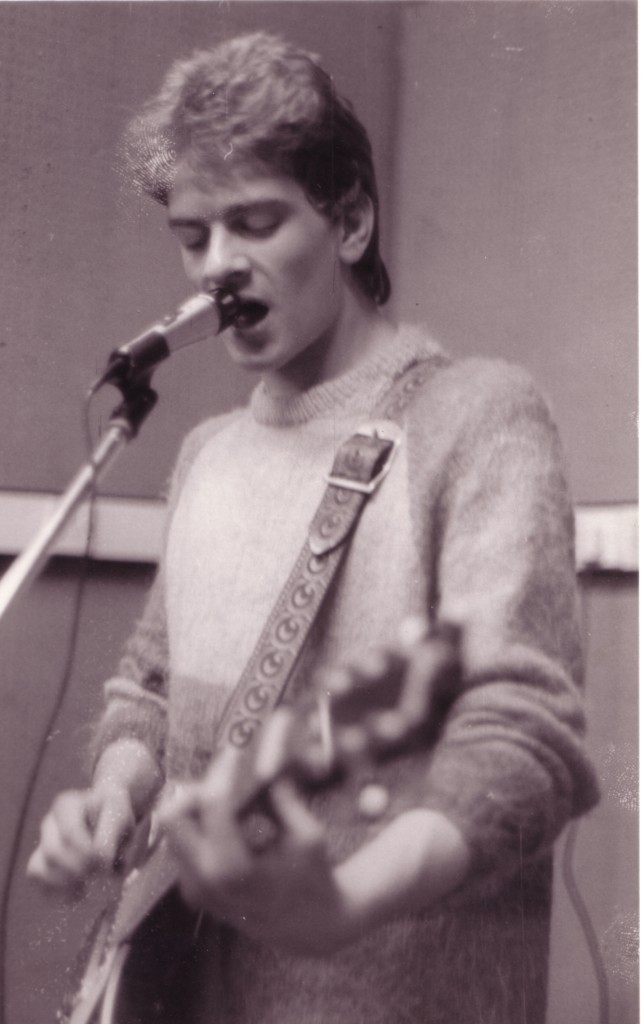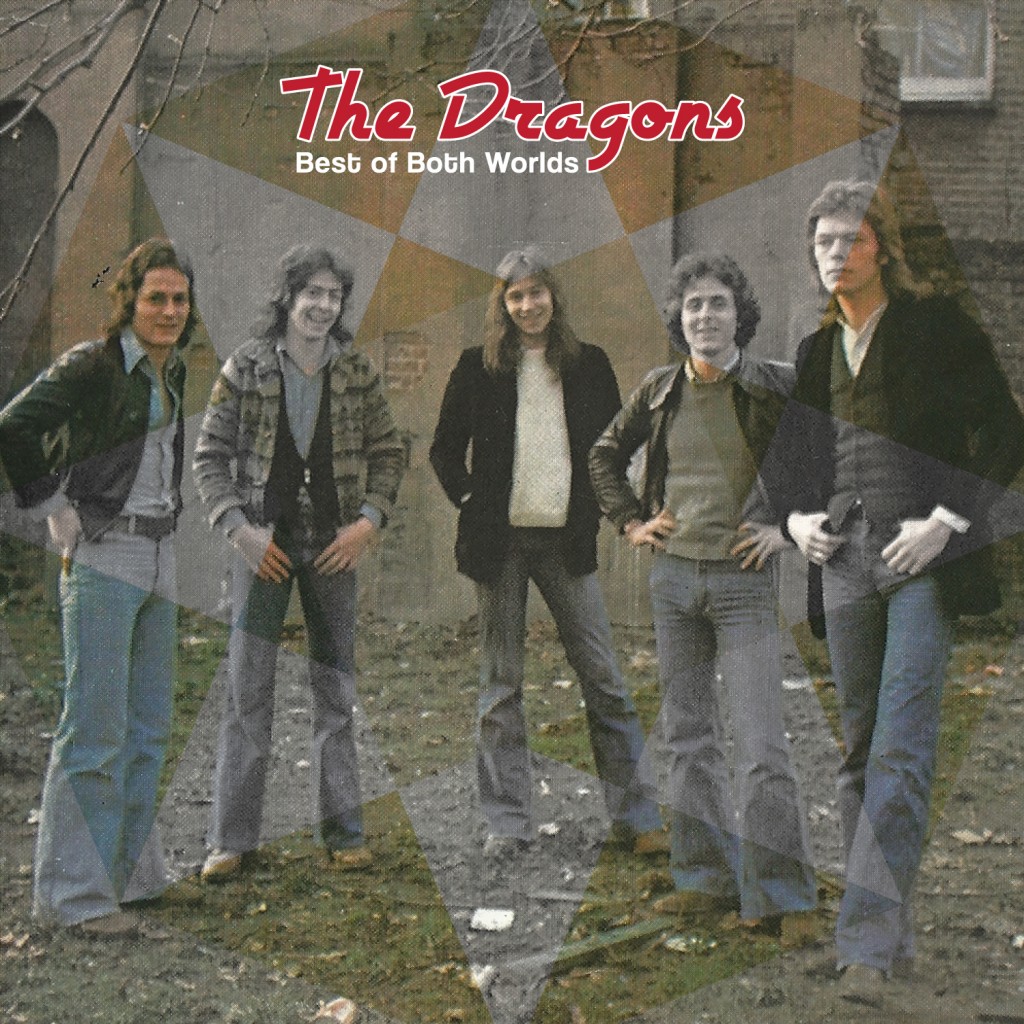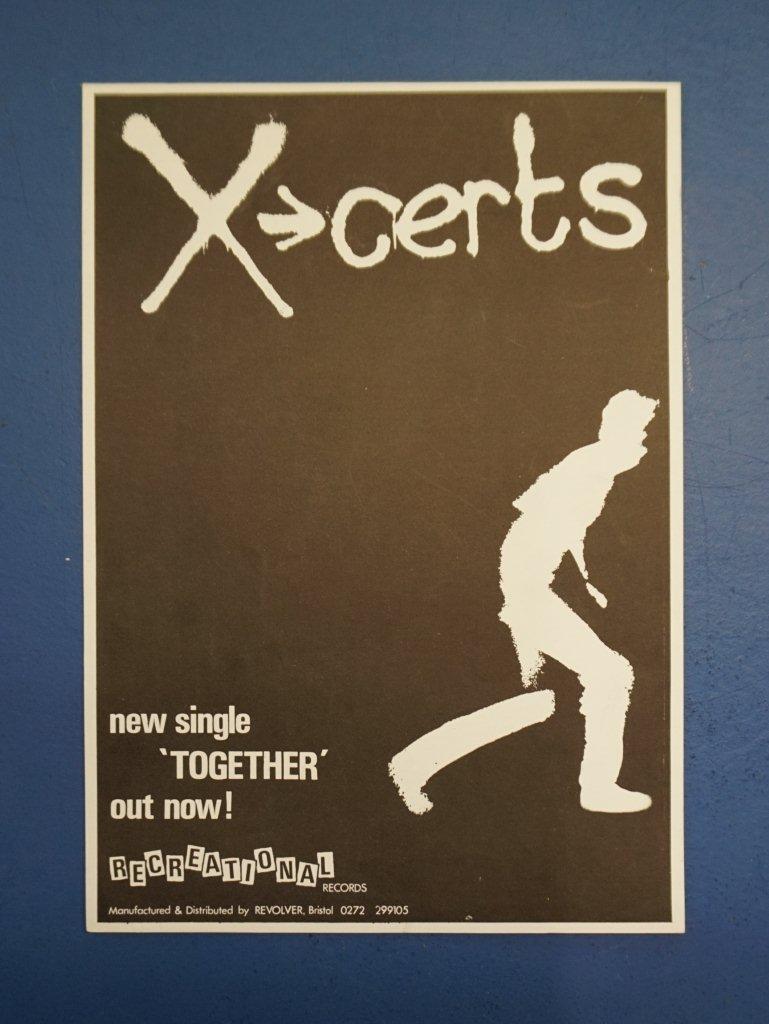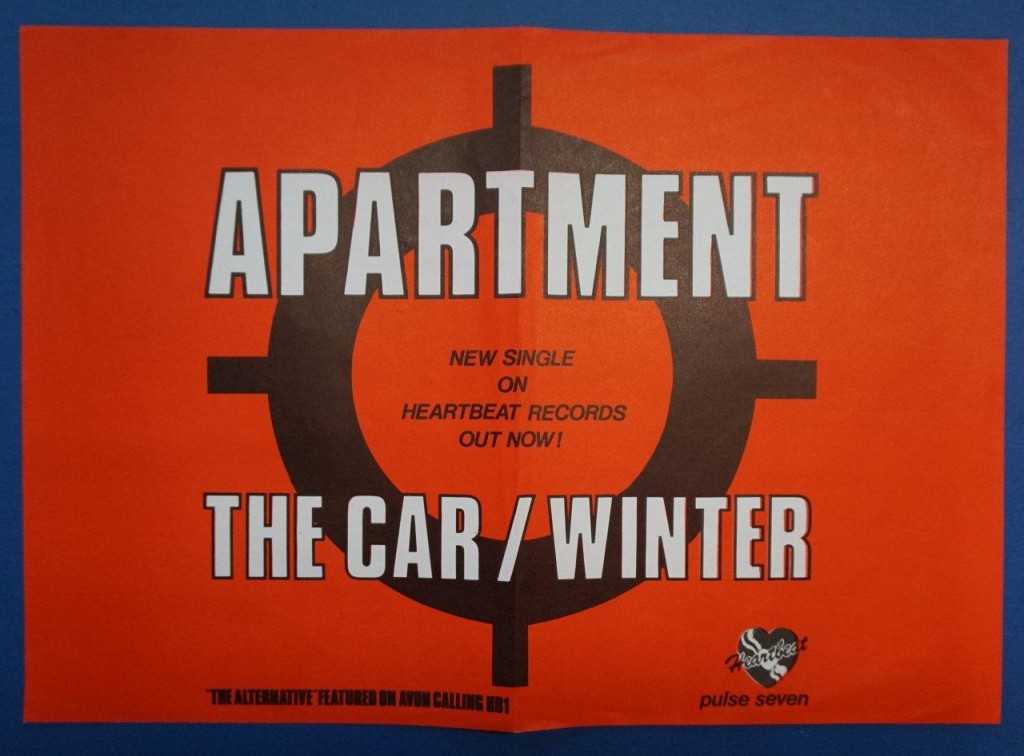“PUNK WAS BRILLIANT…OF ITS TIME AND EXPLOSIVE”: 15 QUESTIONS WITH CLIVE ARNOLD (THE X-CERTS) (2/06/15)
Feb 9, 2015

If I’ve learned one thing from all the musical interviews that I’ve done, it’s that every band is only one or two classic songs away from making an impact…whether it makes the charts or not. That’s how I feel about the X-Certs’ “Queen & Country,” which I found off a blog — don’t we all these days, right? — and immediately couldn’t get out of my head.
Not many songs possess that kind of throat-grabbing immediacy, but “Queen & Country” packs all the right ingredients that a classic of its era (1980, in this case) needed to achieve that goal…starting with a clanging declamatory intro that quickly yields to a brisk, propulsive pop-punk riff.
Crisp, powerful guitars and a relentless backbeat drive home the song’s central point of how the common man always ends up used as cannon fodder for somebody else’s wars (“Uncle Sam needs you/He wants your eyes to see him through/Uncle Sam needs you/He wants your body for a sandbag, too!”). Sadly, time hasn’t done anything to date that particular lyrical scenario — one that would have given the decade’s bigger names a run for their money…if only the band’s chemistry had held together.
Of course, that’s all water under the bridge for the man behind “Queen & Country” — X-Certs singer/guitarist Clive Arnold, who entered a totally creative field (acting), as he explains below. With “Queen & Country” finding renewed life and exposure on the recent BRISTOL BOYS MAKE MORE NOISE! compilation, now like seemed the ideal moment to ask Clive for his impressions of the song, the era and the band behind it all…so relax, tune up, and enjoy the exchange. I certainly did!
CHAIRMAN RALPH (CR): Not many bands can say that they started off rehearsing in a church crypt! What made you want to play guitar in the first place, and how did the band get started?
CLIVE ARNOLD (CA): I remember being aware of music (dancing and trying to sing to songs on the radio) and pestering my parents for a guitar from a very early age. We had an old piano so learning that was my first option. I don’t think I actually got my hands on a guitar with real strings until I was about 10. I remember it was a beast of a thing (acoustic) and made my fingers bleed when I played; couldn’t have bent a string if I’d taken a crane to it. I was still at school when punk exploded and suddenly the idea of being in a band was something tangible right now at 15 years old. I got together with anyone interested, could play or had an instrument; we just started playing. Locally in Barton Hill, a typical working class area of Bristol, the local Church ran a boys club in it’s crypt (it hadn’t been used as one for a while) and after a couple of sessions rehearsing in front rooms and garages we were offered the chance to use it; I’m sure it was because of the noise we were making.
CR: What was the Bristol scene like when you started, and how did things change once punk broke on a national level in the UK? Which bands were the most influential in your own development?
CA: I wasn’t aware of a Bristol scene when punk exploded, in my small 15 year old world bands and musicians existed on the radio and TV or they didn’t exist at all. Punk changed everything; all the rules were torn up and anybody could do anything, without permission from anyone. It was a very powerful time that must have been frightening to those on the outside, we didn’t ask if we were good enough to play, we just picked up our instruments and did. Simple as that! Marc Bolan and T.Rex were huge for me in the early 1970s and they certainly influenced how I approached music on a personal level; I was always looking for a sophisticated/poetical lyric and we included a version of “Children of The Revolution” in our later sets.
CR: As your Bristol Archives bio mentions, your lyrics attracted the interest of such disparate entities as RAR and the Socialist Workers Party — how did these associations come about, and to what extent did they influence your future direction?
CA: It was just natural to write about things we knew, most notably the British class structure and its unspoken limits placed on those (white working class kids, immigrants, women, etc.) not within a select group. These were prejudices we were able to confront through music. Rock Against Racism & Socialist Workers Party picked up on the themes of no hope and discrimination and it was an easy fit. I don’t remember a conversation paving our future as RAR bedfellows but we were very happy with the association. We had some great gigs and are very proud of being part of their world at that time. If we made a little difference, then great.
CR: At what point did you see your own songwriting evolving — in other words, can you point to a particular track that made you say, “We’re on to something bigger and better here?” If so — which one?
CA: I’d been writing songs since I was in my mid teens, but when I was 17 I wrote “Together” which was lyrically much more accomplished than anything I’d done before. I soon after wrote “Queen & Country” and “Visions of Fate”, again which I think was a turning point as a lyricist for me, not that I realized it at the time.
CR: Before long, you supported lots of big names — besides that night with the Clash, which other supports stand out in your memory (good, bad, indifferent)?
CA: We somehow became the “go to” opening act for lots of punk bands gigging in Bristol during this time so we supported: The Buzzcocks, The Only Ones, Pere Ubu, The Associates, Angelic Upstarts and, of course, The Clash.
CR: As far as that night with the Clash goes, what did you take away from it — given that they were arguably at their peak in the UK, and you were still looking to reach something like it? How did they strike you, as people and musicians?
CA: An amazing night, I remember it vividly. The Clash were brilliant, they took the time to get to the hall in time to meet us and watch us play, they were really supportive, knew the name of the band and came across as just great, down to earth blokes who really cared and nicked all our cigarettes off us! We were very happy to share, especially after Nicky “Topper” Headon saved our night by mixing and sound checking us for free after the engineer refused because we didn’t have enough money to pay him; the crafty crew had fleeced us for £50.00 to turn the lights on, then once the money was in their pockets, announced it was another £50.00 payment to get any sound. No one had warned us about the cost and that was a lot of money back then and we didn’t have it between us. Topper turned up just as we were walking off the stage thinking our night had ended before it had begun, heard the story and said, “Fuck it. I’ll mix you myself!” He has been my hero ever since. There were 4,500 people in the audience and we went down well; it was a great night.
The Clash are great people and brilliant artistes who captured a generation around the world. It was a huge honour to play on the same stage as them and will always be a highlight of my life.
CR: What were your recording experiences like? Going from, say, an operation like Simon Edwards to the likes of Stephen Street must have been like night and day, I imagine!
CA: Stephen Street and Simon Edwards worked together, at least with us. Simon was a fabulous champion of Bristol bands during this period and Steve was our Producer from the very first recording, so the journey from our first to last studio recording was very organic as Steve was involved throughout. The studios were more of a leap, going from GBH rehearsal studios in St Pauls, Bristol (a very red light area at the time) to Crescent Studios in Bath (which were used by Peter Gabriel and Tears For Fears as their rehearsal/initial recording studios) was huge. We went from drinking the beer we’d brought in and peeing in a toilet most people would have cringed at, to being able to make coffee (in a machine) and have someone able to “go out” and get us lunch. We were flying high.
GBH was great but really filthy and grimy whereas Crescent Studios was plush with a grand piano in the hallway. I remember feeling nervous the first time at Crescent because I was out of my comfort zone – everything was so clean.
CR: Since I started this discussion with “Queen & Country,” tell me what inspired it — was it a specific incident or headline, or just a general feeling that you had? What other songs from that era hold up today, you think?
CA: The X-Certs were always political. Thatcher came to power when most of the band were able to vote for the first time and there was a lot to fight back against if you were one of the majority and not one of the UK’s privileged citizens. “Queen and Country” came to me when I was thinking about how it is usually the working classes that become the dead of a politician’s war. This has been true for many years, which I think is why you feel it is relevant today. It is a story of the everyman being expendable. Lyrically, “Together” I think is still relevant, the cost of war will always be the same. Sadly.
CR: Why did the band leave so few vinyl footprints behind? Was it a case of, couldn’t get a deal, or were you always determined to strike out your DIY path (so to speak)?
CA: I wish I could say we were determined not to succumb to the Music Industry pitfalls, but the reality is we were a bunch of kids who played, had no idea how the music industry worked and really didn’t know anything, about anything. We played live, that was our thing. Simon Edwards asked us to record for his four-band ep single and all subsequent recordings were thanks to the likes of Simon who guided us and gave us a platform.
CR: That being said, I think “Together” points toward what the X-Certs could have become — how did you see the inclusion of reggae in your sound?
Was it a case of wanting to do more than one thing at a time, or just a willingness to take another “underground sound” (so to speak) on board?
CA: Neil and I grew up in and around the St Pauls area of Bristol; there was a huge Caribbean community and reggae became part of our DNA. Plus, we were huge Clash fans and they showed all of us that music doesn’t have borders and doesn’t belong to just one community. If you feel it, you can play it. When we jammed reggae in rehearsal we found we did it well, so we just kept going. Also, we were playing a lot and getting better musically, so naturally we were wanting to stretch ourselves and reggae was a very natural alternative to power pop punk.
CR: You had a couple of notable lineup changes along the way, like so many bands — then and now — compared to the previous changes, why did Chris’s leaving prove to be the final coffin nail (so to speak)?
CA: Chris Bostock is a fabulous musician and joined the band when we were approaching better musicianship all round and therefore perhaps able to break free of being a Bristol band only. Kevin Mills then joined on guitar, we moved forward and became much more professional with the two of them in the line up. We opened for The Clash with Chris and recorded “Together” the single with Chris and Kevin; those were probably The X-Certs’ finest moments. When Chris left to join Subway Sect and become a professional musician (later to become JoBoxers and then Dave Stewart’s Spiritual Cowboys, we were on the cusp of getting some national recognition – the single had been released and was getting quite a lot of radio airplay. But Chris is a one off and there wasn’t a bass player in Bristol available who could replace him. I remember we played a London gig to promote the single and it was a disaster; the magic/chemistry that we’d recently found had gone and that was the last gig The X-Certs played. It was all over after that.
CR: Looking back, it seems that Bristol doesn’t get much respect — since the official punk histories focus so heavily on London and Manchester, and skip so lightly over the rest!
Would you agree with that sentiment, or do you feel acknowledged enough for what you accomplished in your (roughly) three-year lifetime? Is there such a thing as “the sound of Bristol,” and if so, how would you venture to describe it?
CA: London and Manchester are big UK cities; it figures that they should get the most recognition for music coming out of Britain because their quantity will always be greater. Bristol was like so many other cities across the UK where kids picked up instruments and formed a band – Sheffield, Northampton, Plymouth, etc. I was never aware of a Bristol sound; it would be interesting to investigate though.
CR: Did you play in any notable bands after the X-certs, and is music still part of your life now? (I suspect you’re aware of the current band sharing a similar name, XCerts, whose music is worlds apart from yours?)
What is your old band’s legacy, in your opinion, since its story played out amid the rise of Thatcherism — or do you feel that angle has been blown out of proportion?
CA: I gave up music as a career choice after The X-Certs; I felt we were on the verge of achieving something when we split and the disappointment meant I didn’t want to continue. I took a sideways step and went into acting.
There is a new band from Aberdeen named the Xcerts, who are really good but it is a shame for them they didn’t Google the name first; it can get quite confusing on i-Tunes and Spotify. However, we’ve no complaints if some of their fanbase download us by mistake and discover our music. They might like it.
CA: Of the bands featured on the BRISTOL BOYS MAKE MORE NOISE! comp — which ones do you consider most representative, and which ones is the world still waiting to discover?
CA: It’s difficult to single out one band as representative of the time, we were all doing our thing not realising we were part of something bigger. I was a big fan of The Spics; they played well, there were so many of them on stage and it was always a great show.
CR: Lastly, but not least: forty-odd years after the original punk explosion broke, many of the noxious elements it aimed to overthrow — assembly line pop, authoritarian governments, class divisions-verging-on-chasms — are back in fuller vigor than ever.
Like many people I know, I feel that we’re overdue for some changes — do you see a place where that could happen? From where do you draw your own creative inspiration these days?
CA: Punk was brilliant. Of it’s time and explosive. We tried to change the world, as did generations before us; we left a footprint and influence, isn’t that great? The world keeps turning and the period is remembered and celebrated forty years on. “That’s Something Else”.
LINKS TO GO: BRISTOL ARCHIVE RECORDS (lots of great info here): http://www.bristolarchiverecords.com/bands/x-certsBio.html
THE X-CERTS: http://www.xcerts.co.uk/
Interview conducted by: http://www.chairmanralph.com/communiques/





